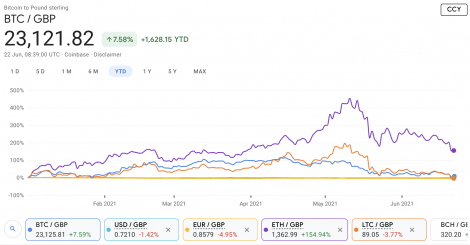Crypto asset: Difference between revisions
Amwelladmin (talk | contribs) No edit summary |
Amwelladmin (talk | contribs) No edit summary |
||
| Line 24: | Line 24: | ||
*[[Distributed ledger technology]] | *[[Distributed ledger technology]] | ||
*[[Cash]] | *[[Cash]] | ||
{{ref}} | |||
Revision as of 09:29, 22 June 2021

|
Silly ones like Bitcoin, onecoin, and sensible ones like the unitary settlement coin — cryopto assets are digital “assets” — it is a loaded term — having no physical extension, and creating all kinds of metaphysical issues which dusty old lawyers are having to get their arms around.
I mean, are they a chose in possession or a chose in action?
More here soon.
Crypto as an asset class
So we are agreed no-one trusts the governments — seen and unseen — any more and the shadowy systems which beam coronavirus from 5G towers and infect us with communism from chemtrails will kill us if we don’t somehow get off the grid.
But if if the unshackled masses suddenly can’t be sure of the bona fides of the central institutions they have until now relied on, what sort of consensus will they reach on the value of intangible tokens on a dematerialised ledger which are not backed by anyone? This is like a cosmic joke, folks.
In our present times of self-isolated peace and relative tranquility, the now “mature” bitcoin — designed to prevent the capricious ministrations of central banks, creating volatility mayhem through self-serving fiscal policy — swings 700% in value over a year, where the mercurial dollar moves a couple of percent. [1]
Crypto as a settlement system
This is distributed ledger technology, which is a handsome idea; sound; and certainly helps ameliorate a problem — namely how to transact safely when you don’t trust the motives or solvency of intermediaries — but this is rather like solving the problem of weeds in your garden by concreting it over.
Trust is a feature, not a bug, of the financial system — not just the financial system, but society at all levels, from family to the UN: if you don’t have it, you are better investing in shotguns and tins of corned beef than crypto-assets on a blockchain.
Better solution: refine your system to value and reinforce trust.
See also
References
- ↑ And no, that doesn’t mean cryptos are the stable one: if they were dollar prices would be subject to hyperinflation, then hyperdeflation, yearly. Haven’t noticed that. Cryptos are not currencies, and since you can’t eat them or make things out of them, they are a lousy commodity too.